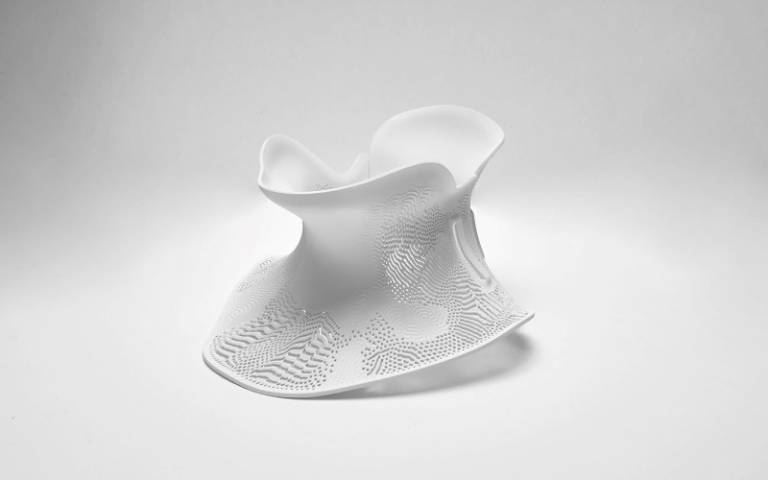3D printed neck collar shortlisted for Design of the Year
27 October 2020
A UCL clinical researcher who developed an innovative 3D printed neck collar, helping transform the lives of people with serious neurological disorders, has been shortlisted for the prestigious ‘Beazley Designs of the Year 2020’.

Dr Luke Hale (UCL Surgery and Interventional Science) is the lead designer behind an innovative workflow process, which combines 3D scanning, procedural design and 3D printing to create personalised support braces.
The braces’ unique form is derived from an algorithm that mimics the structure of the body’s bone and tissue, creating a collar that is light, strong and more comfortable for the patient.
The workflow process is also more responsive to patient feedback than traditional methods of manually casting, sculpting and moulding plastic, and is far quicker; it can be done in just one hospital visit.
Dr Hale’s design, the Biomimetic Collar, has been shortlisted in the Product category of the annual awards, run by the Design Museum, London. The collar's development and related research was supported by a multi-disciplinary UCL team and developed in collaboration with the Royal National Orthopaedic Hospital.
Research and design process
Many individuals with neurological disorders such as motor neurone disease, spinal cord injury, cerebral palsy or strokes wear medical braces, known as orthoses, to offer support to a weakened body part or joint.
In a Nature Scientific Reports paper, researchers from UCL Surgery and Interventional Science show the success of a new method they have developed to create orthoses. The technique combines 3D scanning and 3D printing (both types of computer-aided-design or CAD) to create a unique design which conforms to the body, and is strong and porous, similar to bone.
They demonstrate the process on a woman with a neurological disorder who was unable to hold up her head, severely impacting her quality of life, and in whom all other methods to construct a neck support had failed. Using the new design workflow, a personalised neck collar was made for her to wear for up to four hours every day, with significant improvements to her posture, comfort and breathing.
Dr Luke Hale, who also works as an NHS doctor, said: “The new workflow uses 3D scanning to create a design that is specific and personalised to each patient.
“Algorithms are then used to make the device more comfortable and to generate a structure that is porous and light, but also strong where it needs to be. The patient can then review the design before it is 3D printed.
“The study hopefully demonstrates how technologies can be combined to make a tangible difference to a patient’s life, but also how nature can be used to inspire unique and innovative solutions to clinical problems.”
The conventional method for making medical braces typically takes six weeks, requires multiple hospital visits and involves a skilled clinician creating a plaster cast which is then used to make a thermoplastic collar. Some patients with particular conditions struggle to tolerate the heavy plaster. This can cause extreme discomfort and can prevent the mould setting. Also, for those with rapidly progressive conditions, the extended time to provide the brace may mean they deteriorate before it is provided.
However, the multi-disciplinary UCL team based at the Royal National Orthopaedic Hospital, have developed an entirely new method that eases patients’ comfort and can be rapidly produced in just one hospital visit.
Dr Hale added: “The brace can be 3D printed on the spot. Crucially, this means that individuals could have a customised design created in one visit, compared to six weeks using the traditional method.
“This would save them weeks of waiting and, particularly for those with severe neurological disorders, save them potentially stressful and burdensome travel during multiple trips to hospital.”
Dr Deepak Kalaskar (UCL Surgery and Interventional Science), said: “We validated our method by creating a neck collar for an individual with a condition known as transverse myelitis, which meant she was unable to hold her head up on her own. However, this same technique could be applied to any part of the body that needs support.
“It could be life-changing for patients with a range of different neurological disorders or even individuals recovering from trauma injury. The whole workflow process can be automated and so, in the future, could be adopted by various hospitals – greatly widening the potential use and impact of this new technique.”
The Beazley Designs of the Year 2020 is on display at the Design Museum until March 28. Individual category winners and one overall winner will be announced on November 26.
Links
- Research paper published in Nature Scientific Reports
- Dr Luke Hale’s academic profile
- Dr Deepak Kalaskar’s academic profile
- UCL Surgery and Interventional Science
- UCL Healthcare Engineering
- Royal National Orthopaedic Hospital
- Beazley Designs of the Year 2020
- The Design Museum
Image
- Biomimetic Collar, credit Matthew Town
Media contact
Henry Killworth
Tel: +44 (0) 7881 833274
E: h.killworth [at] ucl.ac.uk
 Close
Close

